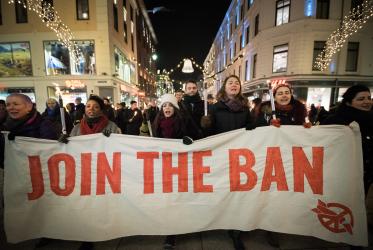Hiroshima, Japan - Seventy years after nuclear fireballs exploded over two Japanese cities, an ecumenical group of pilgrims has come to listen to those who survived and renew the struggle against their own countries’ continued reliance on nuclear weapons.
“We come to remember and to acknowledge the devastation of the past and to say, ‘Never again,’” said United Methodist Bishop Mary Ann Swenson in a sermon during an 5 August ecumenical prayer service in the Catholic Memorial Cathedral for World Peace in Hiroshima.
Swenson, who is from the United States, and church leaders from Germany, South Korea, Japan, Norway, Pakistan and the Netherlands – all countries possessing nuclear weapons or living under the United States nuclear umbrella, have come to Japan for a five-day “Pilgrimage of Justice and Peace.” They began their work in Tokyo, where they met with Japanese Christian leaders before sharing their concerns with a Japanese foreign ministry official in charge of arms control and disarmament.
The pilgrims then traveled to Hiroshima, where they marched through the streets to the Memorial Cathedral, which was built in the early 1950s by bomb survivors, using clay bricks made on the site. The cathedral’s bells were crafted in Germany using steel from melted-down weapons from World War II.
In her sermon, Bishop Swenson, who is vice-moderator of the World Council of Churches Central Committee, said it was important for her group, and for all people of faith interested in peace, to hear the voice of the hibakusha – the Japanese term for survivors of the bombings of Hiroshima and Nagasaki. The term is now being applied by many in Japan to those who have suffered from the disastrous 2011 explosions at nuclear plants in Fukushima.
“We must listen to all who suffer nuclear harm, those whose bodies are deformed by genetic mutations, whose lands and seas are poisoned by nuclear tests, whose farms and cities are fouled by nuclear accidents, whose work in mines and power plants exposes them to radiation,” Swenson said in her sermon.
“Use the energy of the atom in ways that threaten and destroy life is a sinful misuse of God's creation,” Swenson declared.
“It is time to judge armaments and energy use by their effects on people and on God's creation. It is time to confess that our desire for material comfort and convenience insulates us from the concern for the source and quantity of the energy we consume. It is time to abandon all support for retaining nuclear weapons. It is time to refuse to accept that the mass destruction of other people can be a legitimate form of protection of ourselves,” she said.
According to Peter Prove, the director of the WCC's Commission of the Churches on International Affairs, the delegation is visiting Japan at a very critical time.
“Seventy years have passed since the atomic bombs fell on these cities, and the survivors of those blasts have been calling for an end to those weapons all these years. But those voices are being stilled by age. Their generation is passing. So we think it’s time we picked up their call and brought about an effective end to these nuclear weapons, so they’re never used again. That’s what our delegation is here to do. To call for a humanitarian ban on nuclear weapons, fill the legal gap, and take away the fig leaf of a nuclear non-proliferation regime that provides a disguise for inaction and for maintaining the status quo,” Prove said.
“There is momentum outside the formal process of the non-proliferation treaty talks. We have a new initiative, the Humanitarian Pledge, which the majority of states around the globe now support. They want to move forward to a legal ban on these weapons of mass destruction. All other categories of weapons of mass destruction – cluster bombs, land mines, chemical weapons – have a legal ban. Not nuclear weapons. Why not? And now a majority of states are lining up behind this legal ban, the only thing that stands in our way is that small minority of states that are nuclear-armed or are dependent on the nuclear armed states,” he said.
Video: WCC justice and peace pilgrims in Hiroshima (4 min)
Read also:
WCC encourages churches to pray on Hiroshima Day (WCC press release of 6 August 2015)
German bishop pledges ecumenical push for prohibition of nuclear weapons (WCC press release of 6 August 2015)
Mary Ann Swenson: It is time to abandon all support for retaining nuclear weapons (WCC press release of 5 August 2015)
Church leaders pilgrimage to Hiroshima and Nagasaki: fact sheet







